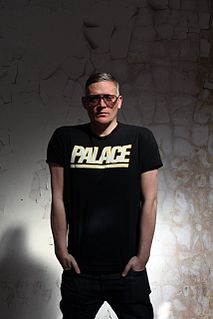A Quote by Annabelle Wallis
I like the idea that I come into a room, and you think you're dealing with one thing, but the truth is I'm very layered.
Related Quotes
What I hate about kitchen-sink dramas is [this idea] that the set is real, therefore you're going to be seeing truth. You have to earn truth. Truth can't be a part of the fact that people appear to talk that way and live in that room. You're looking for the poetry in something, and I don't mean poetry in the fancy sense. Naturalism believes by just replicating a thing you give the truth, rather than earning the truth.
I've always drawn a lot. I like the idea of turning a 2-D sketch into a 3-D thing very quickly. And clothing is really good for that. You can draw an idea in the morning and you can see it by the end of the day. I think if it were something like a four-month process to get from the idea to the final thing, I would get quite bored.
We think that the point is to pass the test or overcome the problem, but the truth is that things don't really get solved. They come together and they fall apart. Then they come together again and fall apart again. It's just like that. The healing comes from letting there be room for all of this to happen: room for grief, for relief, for misery, for joy. (10)
Performance is made in the editing room, and I've come to see the truth in that - the idea that they say performances are usually made in the editing room because what you film is the raw material. I think just going through the process of saying, "Which take do we use? Why is that the take we want? I want that take can you edit again, I'm not sure that's the one, I think it's this one." And just because you go through that process, I think somehow it's made me sort of more open about the [actor's] possibilities.
For [people] to be like "So what it's like dealing with female characters who are completely disgusting?" I don't think they are - does that make me weird? I made a very intentional choice to not care about that stuff, and go like "I don't care about it, I'm just gonna tell my truth and see what happens."
When you get an idea, so many things come in that one moment. You could write the sound of that idea, or the sound of the room it's in. You could write the clothes the character is wearing, what they're saying, how they move, what they look like. Instead of making up, you're actually catching an idea, for a story, characters, place, and mood - all the stuff that comes. When you put a sound to something and it's wrong, it's so obvious. When it's right, the whole is greater than the sum of the parts. That's a magical thing that can happen in cinema.
There are places and spaces for black writers to write about race as a central thing. It's important. We're still dealing with the remnants of slavery. We're still dealing with racism on a daily basis. For me, I choose to write books about black people where we are normal. I was raised to believe that I deserve to be in a room just like anybody else. I try to write books like that.
People believe that there's no room for change, there's no room to grow and if we're talking about this idea of God which is the infinite then there's no way that there's no room to grow because infinity is endless. So there must be more room to understand more and to evolve the way we think about this idea.
I think that the needs of the VA and the needs of the veteran community are very, very significant. ?e're talking about a VA system in which, in the last years a million-and-a-half more people have come into the system. You're dealing with 500,000 people have come home from Iraq an Afghanistan with PTSD and TBI. You're dealing with an older veterans population from World War II and Korea who need some difficult medical help. We want to see it be more efficient. We want to see doctors go to where they're needed.
I believe that movements start when individuals who feel very isolated and very alone in the midst of an alien culture, come in touch with something life-giving in the midst of a death-dealing situation. They make one of the most basic decisions a human being can make, which I have come to call the decision to live "divided no more," the decision to no longer act differently on the outside than one knows one's truth to be on the inside
You know, an idea is just an idea. There seems to... the kind of epiphanies that you have, like the little sudden bursts of light, they're very small and they're very short and it's the pursuit of the idea that's the important thing. . . . I know a lot of people who have way better ideas than I do that-much more frequently than I do that just can't sit down and actually do it. Ideas are such are a little overrated really; it's the work behind the idea that's the important thing.




































